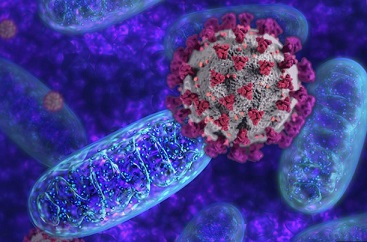Philadelphia Study Validates That SARS-CoV-2 Causes Mitochondrial Metabolic And Epigenomic Reprogramming
Nikhil Prasad Fact checked by:Thailand Medical News Team Apr 12, 2024 1 year, 1 day, 10 hours, 28 minutes ago
COVID-19 News: The ongoing battle against the SARS-CoV-2 virus has unearthed intricate details about how this pathogen affects cellular metabolism, particularly focusing on mitochondrial functions and epigenomic regulations. Understanding these mechanisms is crucial for devising effective therapeutic strategies and comprehending the long-term consequences of COVID-19, including the phenomenon known as long-COVID.
 SARS-CoV-2 Causes Mitochondrial Metabolic And Epigenomic Reprogramming
Thailand Medical
SARS-CoV-2 Causes Mitochondrial Metabolic And Epigenomic Reprogramming
Thailand Medical News had covered previous studies that showed that SARS-CoV-2 infections affects the mitochondria in a variety of ways that causes a multitude of resulting medical and health conditions.
https://www.thailandmedical.news/news/could-study-that-shows-proteins-nsp12-and-13-of-sars-cov-2-causing-mitochondrial-dysfunction-explain-for-prevalence-of-chronic-fatigue-syndrome-in-cov
https://www.thailandmedical.news/news/breaking-covid-19-research-coronavirus-study-reveals-that-sars-cov-2-orf9b-protein-binds-to-human-host-mitochondria-protein-tom70
https://www.thailandmedical.news/news/covid-19-news-sars-cov-2-coronavirus-attacks-mitochondria,-the-power-house-of-cells-in-human-host-constant-fatigue-could-result-from-this
https://www.thailandmedical.news/news/study-discovers-that-sars-cov-2-orf10-causes-break-down-of-mitochondrial-antiviral-signaling-protein-mavs,-suppressing-host-immune-response
https://www.thailandmedical.news/news/latest-international-study-finds-that-sars-cov-2-virus-inhibits-mitochondrial-gene-transcription,-increasing-risk-of-organ-failure-and-death
https://www.thailandmedical.news/news/covid-19-research-study-finds-that-sars-cov-2-orf3c-protein-localizes-to-mitochondria,-inhibiting-innate-immunity-by-restricting-ifn-%CE%92-production
mic-interplay-between-sars-cov-2-and-mitochondrial-function-implications-for-long-covid">https://www.thailandmedical.news/news/the-dynamic-interplay-between-sars-cov-2-and-mitochondrial-function-implications-for-long-covid
https://www.thailandmedical.news/news/italian-researchers-uncover-that-sars-cov-2-orf3c-protein-hijacks-mitochondrial-metabolism-and-autophagy
https://www.thailandmedical.news/news/sars-cov-2-spike-proteins-causes-mitochondrial-dysfunction-and-exhibits-warburg-effect,-leading-to-redox-shift-and-cellular-anabolism
https://www.thailandmedical.news/news/study-finds-that-epithelial-galectin-3-induces-mitochondrial-complex-inhibition-and-cell-cycle-arrest-of-cd8-t-cells-in-severe-covid-19
https://www.thailandmedical.news/news/covid-19-news-uk-led-study-finds-that-the-sars-cov-2-protein-orf3c-is-a-mitochondrial-modulator-of-innate-immunity
https://www.thailandmedical.news/news/sars-cov-2-spike-glycoprotein-interacts-with-monoamine-oxidase-b-and-impairs-mitochondrial-energetics-causing-neurodegenerative-issues
https://www.thailandmedical.news/news/covid-19-news-new-zealand-study-finds-that-sars-cov-2-causes-neurons-to-degenerate-and-die-via-mitochondrial-dysfunction-and-disruption-of-metabolism
https://www.thailandmedical.news/news/murine-study-shows-that-sars-cov-2-nsp12-suppresses-mitochondrial-function-in-heart-tissues
https://www.thailandmedical.news/news/study-discovers-the-impact-of-sars-cov-2-e-and-m-proteins-on-host-cell-calcium-homeostasis-and-er-mitochondria-interactions
SARS-CoV-2 and Cellular Metabolism
The impact of SARS-CoV-2 on cellular metabolism is profound and multifaceted. Research conducted at institutions like the Children's Hospital of Philadelphia and the University of Pennsylvania that is covered in this
COVID-19 News report, has shed light on how this virus modulates various metabolic pathways within host cells. Central to this modulation is the inhibition of mitochondrial oxidative phosphorylation (OXPHOS), a process critical for cellular energy production.
Mitochondrial Dysfunction and Reactive Oxygen Species
One of the key observations in SARS-CoV-2-infected cells is the inhibition of OXPHOS, leading to decreased ATP production and altered cellular energetics. This inhibition also results in increased production of mitochondrial reactive oxygen species (mROS). These mROS play a dual role in viral replication and immune activation. They contribute to viral biogenesis by redirecting carbon molecules from mitochondrial oxidation to glycolysis and the pentose phosphate pathway (PPP). Simultaneously, elevated mROS levels trigger innate immune responses through the release of mitochondrial DNA (mtDNA).
Viral Proteins and Metabolic Alterations
Several viral proteins encoded by SARS-CoV-2 play a crucial role in mediating these metabolic alterations. Proteins like Orf8 and Orf10 have been identified as key players in restructuring both nuclear DNA (nDNA) and mtDNA OXPHOS gene expression. This restructuring, possibly through epigenomic modifications, contributes to the persistence of metabolic changes even after the virus is cleared, potentially leading to long-COVID symptoms.
In-Depth Analysis of Metabolic Pathways
Further investigations have delved into specific metabolic pathways affected by SARS-CoV-2. Glycolysis, the pentose phosphate pathway (PPP), de novo nucleotide synthesis, and fatty acid synthesis emerge as critical pathways hijacked by the virus to support its replication and assembly. Understanding these pathways in detail is crucial for identifying potential therapeutic targets.
Influence of Viral Proteins on Host Cell Metabolism
Viral proteins interact with host cell machinery, impacting metabolic processes at various levels. For instance, the stabilization of hypoxia-inducible factor 1-alpha (HIF-1α) by mROS leads to increased glycolysis, which fuels viral replication. Additionally, the induction of mammalian target of rapamycin complex 1 (mTORC1) by SARS-CoV-2 further enhances nutrient uptake and metabolic reprogramming to support viral proliferation.
Role of Mitochondrial Dynamics
Beyond energy production, mitochondria play a crucial role in cellular signaling and stress responses. SARS-CoV-2 infection leads to altered mitochondrial dynamics, including decreased mitochondrial number, increased fragmentation, and impaired mitochondrial biogenesis. These changes contribute to cellular stress and immune dysregulation observed in COVID-19 patients.
Epigenomic Modulation by SARS-CoV-2
Emerging evidence suggests that SARS-CoV-2 may directly or indirectly modulate the host cell epigenome. This modulation could occur through viral protein interactions with histones or alterations in mitochondrial metabolite levels that influence epigenetic modifications. Such epigenomic changes may contribute to the long-lasting effects of COVID-19, including the persistence of metabolic abnormalities.
Long-COVID and Mitochondrial Implications
The concept of long-COVID, characterized by persistent symptoms long after the acute phase of infection, has garnered significant attention. Interestingly, many long-COVID symptoms align with manifestations of mitochondrial dysfunction, hinting at a potential link between SARS-CoV-2-induced metabolic alterations and long-term health consequences.
Therapeutic Considerations and Future Directions
Understanding the intricate interplay between SARS-CoV-2 and cellular metabolism opens avenues for targeted therapeutic interventions. Strategies aimed at restoring mitochondrial function, modulating oxidative stress, and rebalancing metabolic pathways could hold promise in managing both acute COVID-19 and mitigating long-term complications.
Conclusion
In conclusion, SARS-CoV-2 induces profound metabolic alterations within host cells, particularly affecting mitochondrial functions and epigenomic regulations. These changes not only facilitate viral replication but also contribute to immune dysregulation and long-lasting health implications seen in long-COVID patients. Further research into the intricate mechanisms of viral-host interactions at the metabolic level is essential for developing effective therapies and improving outcomes in COVID-19 management.
The study findings were published in the peer reviewed journal: Pharmacological Research.
https://www.sciencedirect.com/science/article/pii/S1043661824001142
For the latest
COVID-19 News, keep on logging to Thailand Medical News.
Read Also:
https://www.thailandmedical.news/news/study-shows-that-sars-cov-2-coronavirus-hijacks-human-host-metabolic-pathways-for-its-replicative-advantage
https://www.thailandmedical.news/news/austrian-multi-omics-study-discovers-unique-anti-inflammatory-immune-signature-and-metabolic-alterations-in-individuals-with-long-covid
https://www.thailandmedical.news/news/study-finds-that-covid-19-induced-acute-kidney-injury-similar-to-sepsis-caused-kidney-injury-and-that-mitochondrial-dysfunction-may-play-a-key-role
https://www.thailandmedical.news/news/covid-19-news-sars-cov-2-structural-proteins-affects-oral-health-by-causing-periodontal-fibrosis-via-deregulating-mitochondrial-b-oxidation
https://www.thailandmedical.news/news/breaking-sars-cov-2-infections-can-cause-downregulation-of-fumarate-hydratase,-leading-to-chronic-inflammation-and-renal-carcinoma
